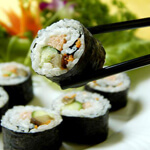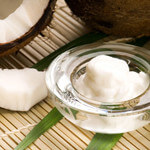 Nori is an edible red seaweed that is popular in East Asia, especially Japan. In the West, it is perhaps best known as the seaweed that wraps pieces of sushi, although it is also used as a garnish, for flavoring noodle dishes and soups, or as a health supplement. Indeed, as the nutritional value of nori continues to come to light, more and more health food stores worldwide are beginning to sell it in fresh or dried form.
Nori is an edible red seaweed that is popular in East Asia, especially Japan. In the West, it is perhaps best known as the seaweed that wraps pieces of sushi, although it is also used as a garnish, for flavoring noodle dishes and soups, or as a health supplement. Indeed, as the nutritional value of nori continues to come to light, more and more health food stores worldwide are beginning to sell it in fresh or dried form.
List of Health Benefits
Rich in protein – 100 grams of nori contain between 30 and 50 grams of protein, making it one of the plant world’s richest sources of protein and comparable in density to spirulina, chlorella, and soybeans. Protein is needed for building and repairing muscles, building enzymes and antibodies, and cell maintenance and growth.
Lowers cholesterol – According to a study published in the British Journal of Nutrition in February 2008, when rats that were on an otherwise high-cholesterol diet were fed nori, their LDL cholesterol levels lowered, suggesting that nori plays an important role in stabilizing cholesterol levels. Perhaps this is because nori is surprisingly rich in omega-3 fatty acids, which are well-known for reducing LDL cholesterol. They also help lower blood pressure, therefore making nori excellent for the cardiovascular system.
Dietary fiber – Nori is comprised of approximately 33 percent dietary fiber, making it an effective laxative and a good cure for constipation. Also, since high-fiber foods have the ability to make you feel full for longer, nori is also a good weight loss food (a fact that is reinforced by its low calorie and fat content).
Lowers cancer risk – A study published in the British Journal of Nutrition in May 2010 found that the regular consumption of nori was linked to lowered rates of breast cancer for menopausal and pre-menopausal women. This is unsurprising, since nori is rich in antioxidants like vitamin C that help neutralize the cancer-causing effects of free radicals.
High in iron – 100 grams of nori contain approximately 88 percent of our recommended daily intake (RDI) of iron, making it an extremely rich source of this much-needed mineral. Furthermore, a Venezuelan study published in the Journal of Nutrition in 2007 showed that nori – unlike many grains and beans – doesn’t contain phytates, which can drastically lower the absorption rate of iron.
Improves bone health – 100 of nori contain 280 milligrams of calcium (28 percent of our RDI) and 300 milligrams of magnesium (85 percent of our RDI). While we all know that calcium is good for the bones and is needed to prevent osteoporosis, lesser-known is that fact that we also need magnesium to help absorb it. Since nori contains sizable quantities of both, it is the perfect bone-builder.
Impressive iodine content – Sea vegetables are the plant world’s premier source of iodine, and nori doesn’t disappoint. 100 grams of it contain approximately six milligrams of this extremely important mineral. Indeed, according to the Food Standards Australia New Zealand, one sushi roll wrapped in nori contains 92 micrograms of iodine, which is close to an adult’s RDI of 150 micrograms. Iodine deficiencies are very common in the West and can lead to serious conditions such as goiter and hyperthyroidism.
Aside form the nutrients already mentioned, 100 grams of nori also provide us with vitamin A (288 percent of our RDI), thiamine (60 percent), riboflavin (194 percent), niacin (78 percent), folate (475 percent), as well as impressive levels of phosphorous, potassium, zinc, and vitamins C, E, and K.






